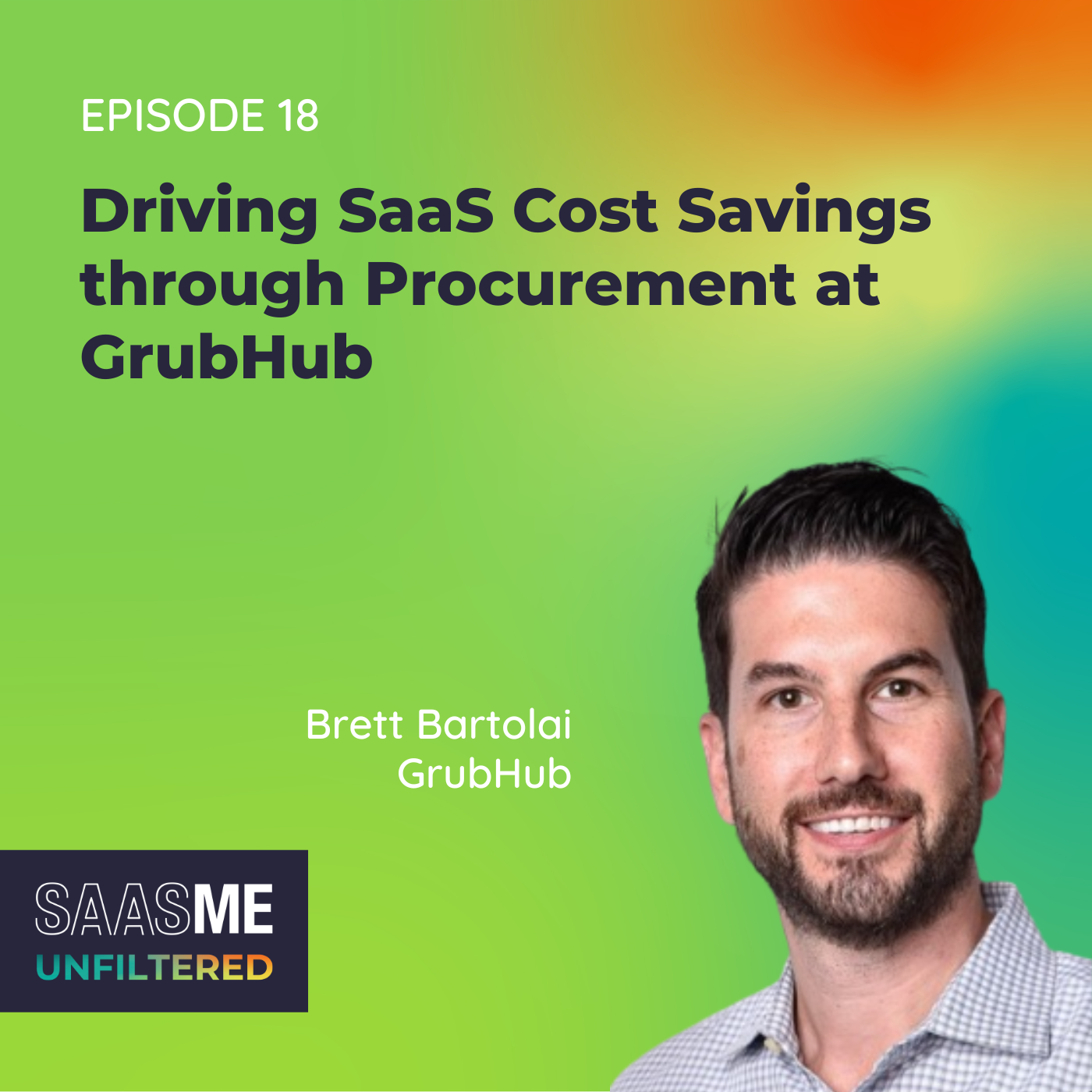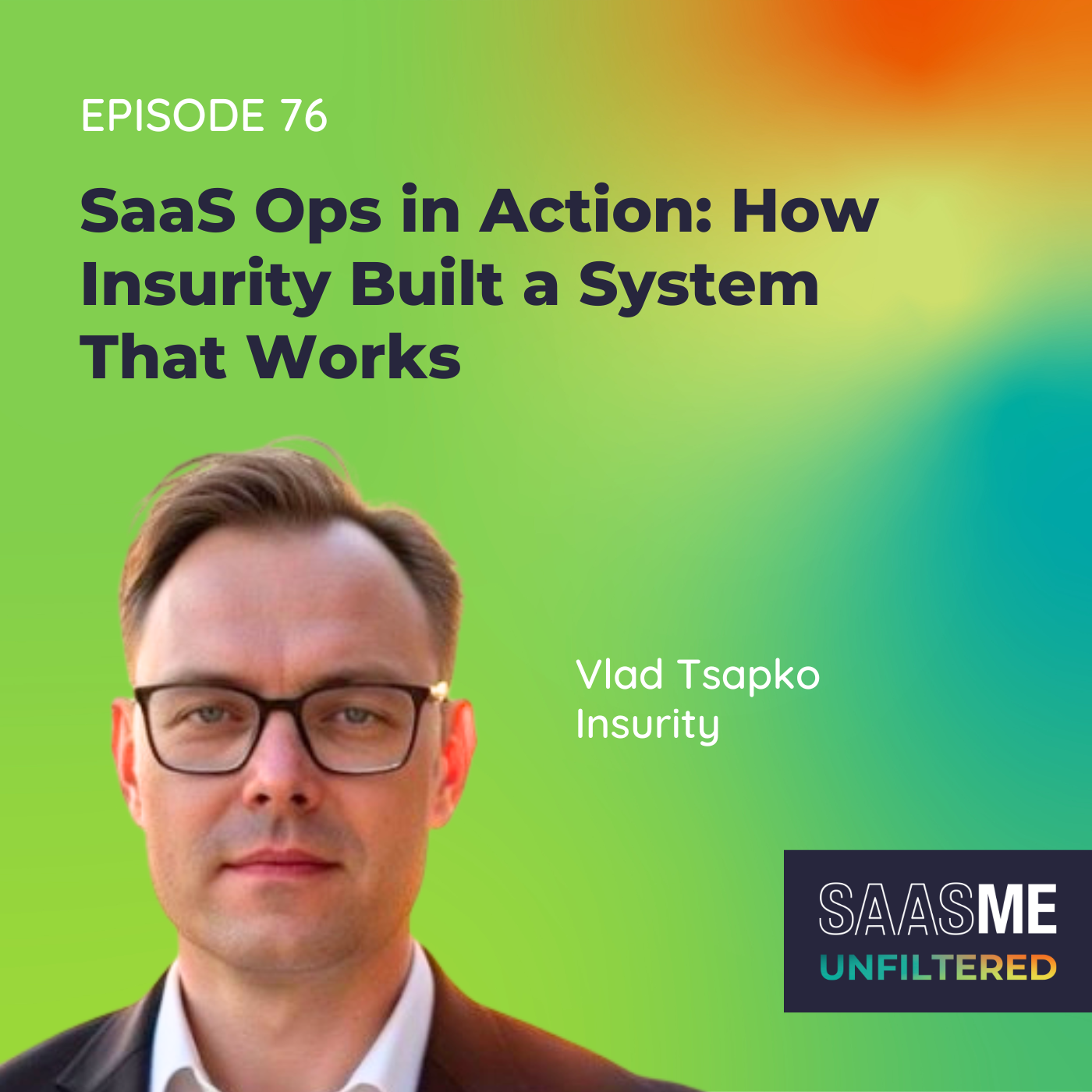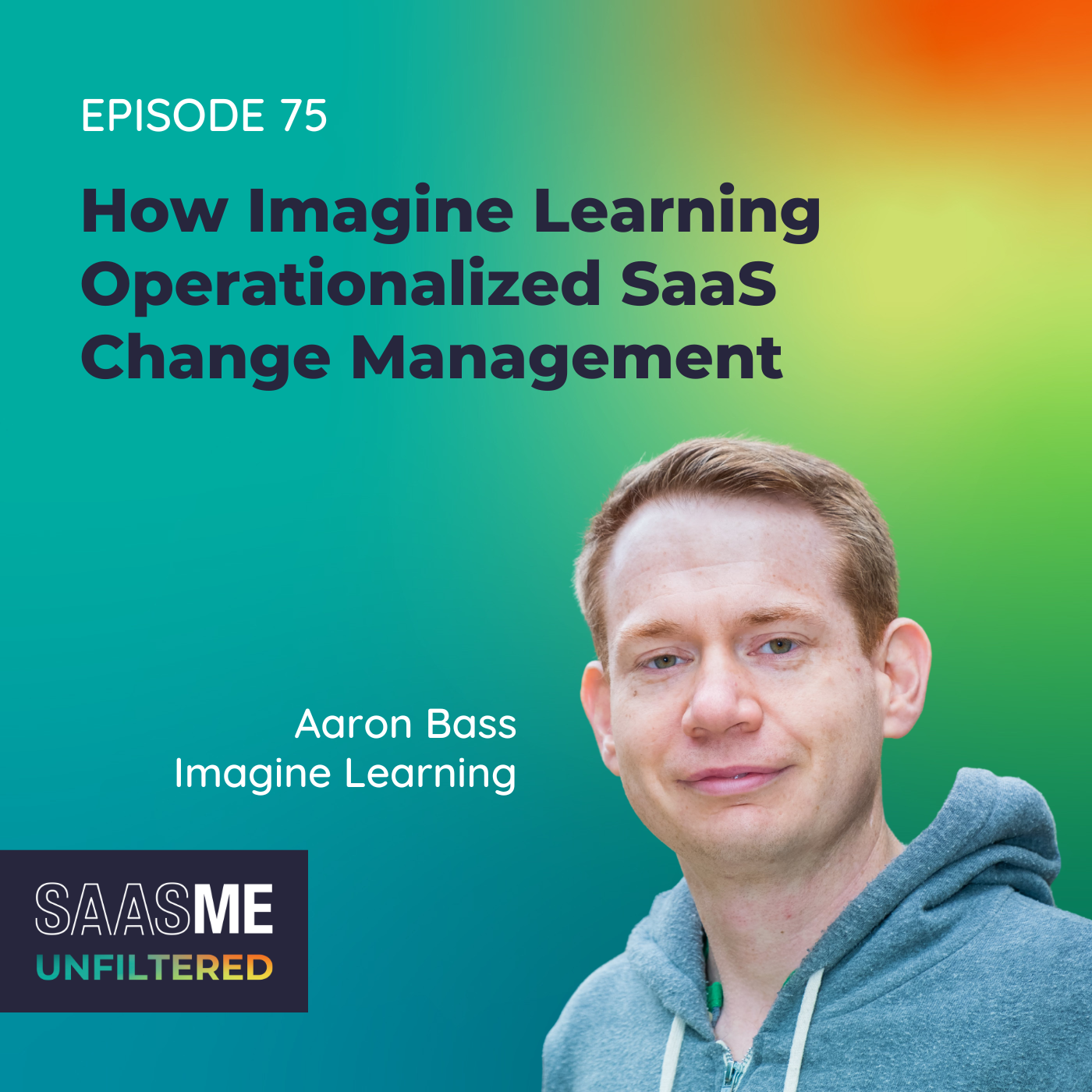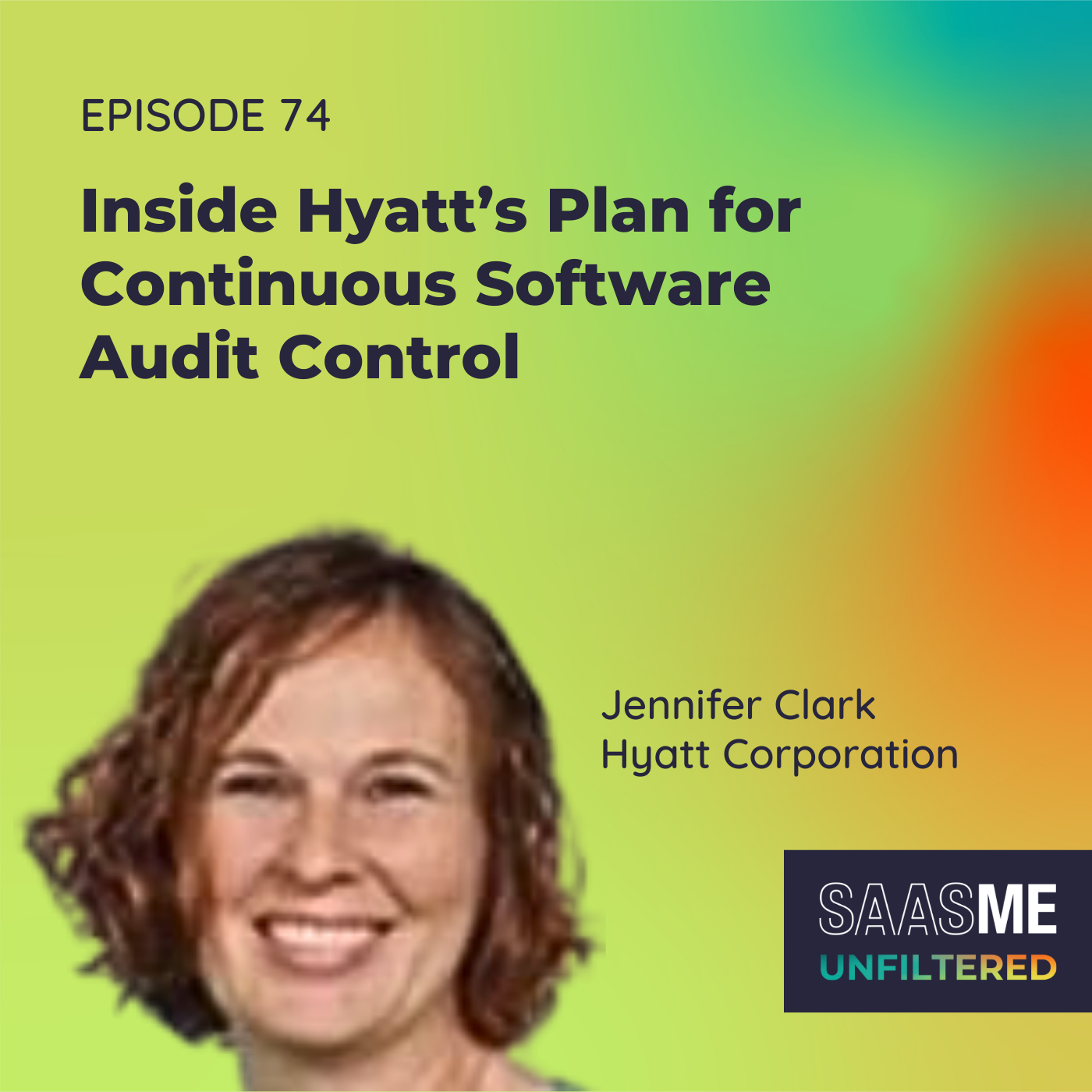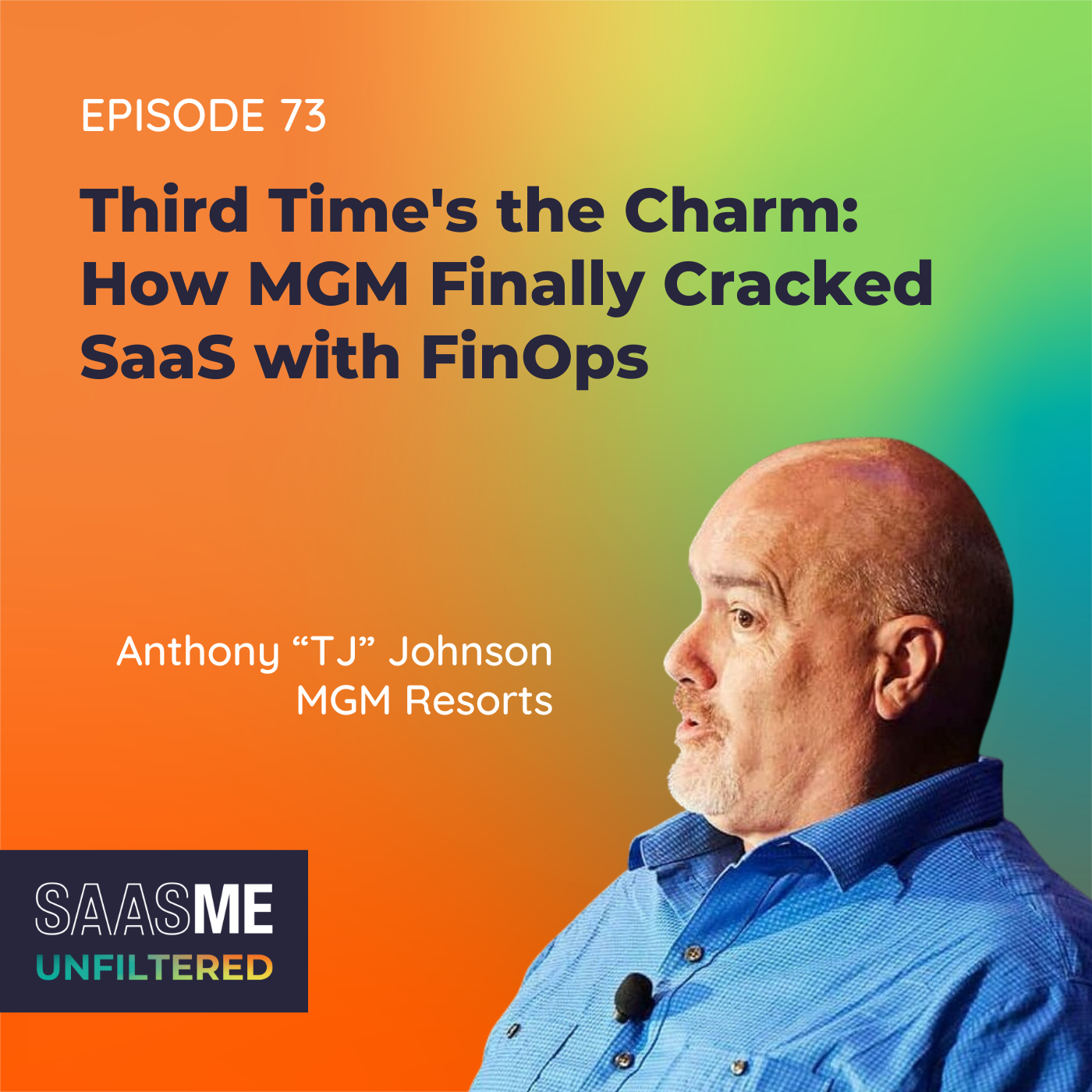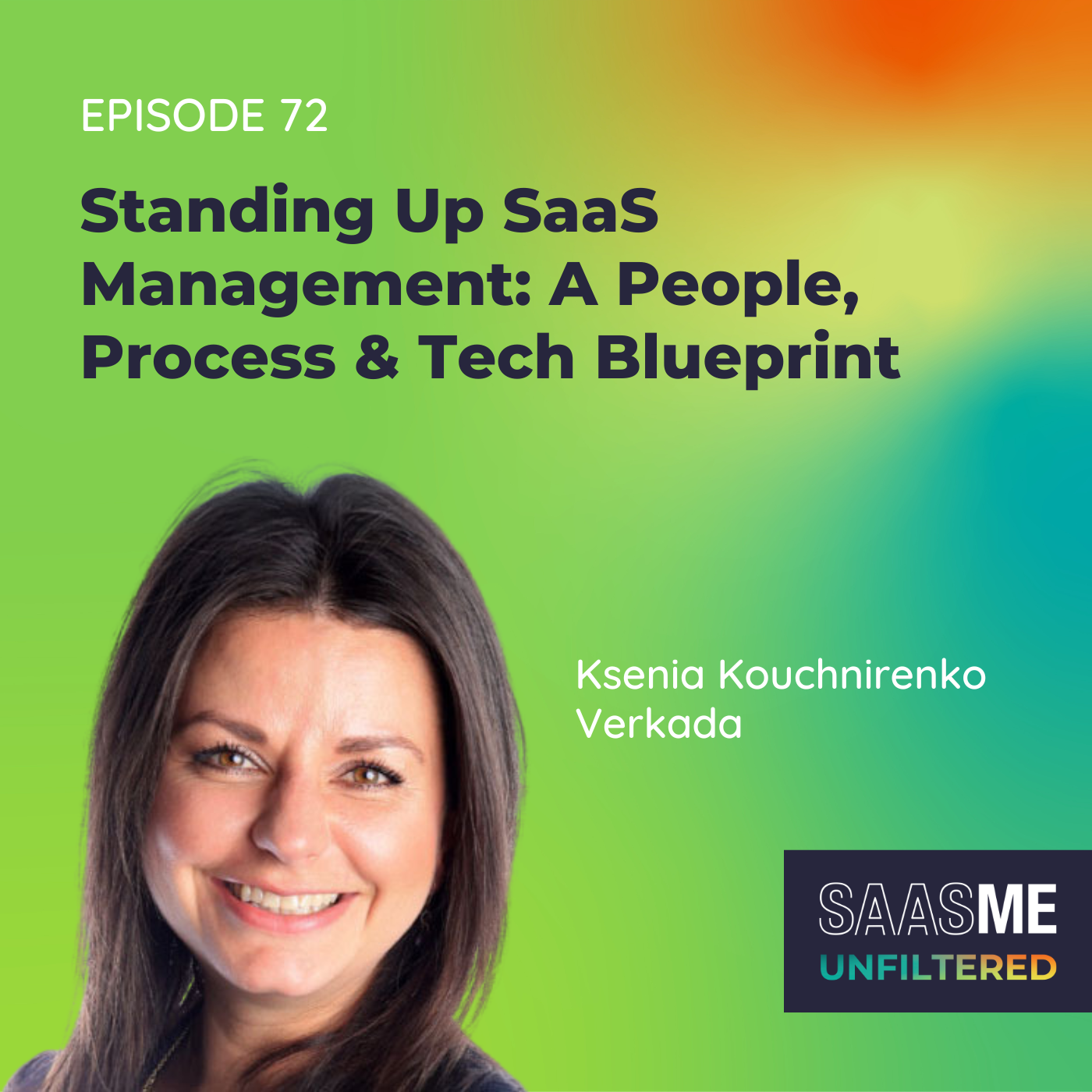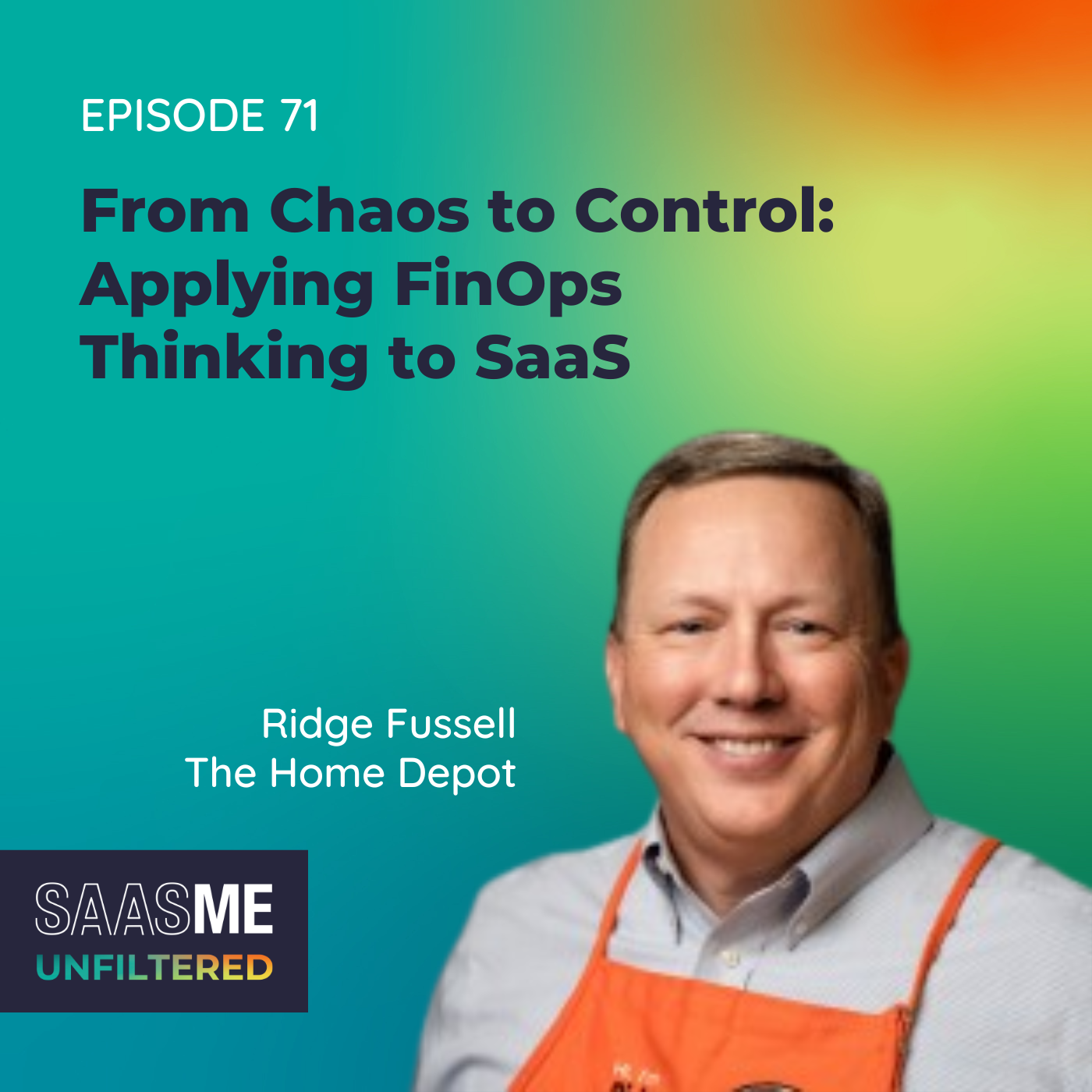Brett Bartolai: Driving SaaS Cost Savings through Procurement at GrubHub
- 0.5
- 1
- 1.25
- 1.5
- 1.75
- 2
Brett Bartolai: All this freemium software that's out there, something like Slack is not to point too many fingers here, but it's a nice example where Slack can start out as a free tool and then all of a sudden your entire organization is using it and it's so protected and now you have to pay for it. You do a double take and say, " Well, what happened there?" And I don't want to pick on them because Slack's great. But there's plenty of examples like that where if you let your guard down, if you let people sign up for free stuff, it can get out of hand really, really quickly and...
Cory Wheeler: Hello, hello and welcome to SaaSMe Unfiltered, The SaaS Management Podcast, the show with give it to you straight real life advice from pros knee- deep in SaaS every single day. SaaS management superheroes just like you. We are back for another episode of SaaSMe Unfiltered. Really excited to have everyone join us today. I'm Cory Wheeler, co- founder and chief customer officer here at Zylo. We've got a really special guest here today. I'm very excited. I've known this person for many years now, which is really awesome to be able to say as Zylo continues to scale into the future. We've got a lot of folks that were on board with us early on that believed in the value prop, and our guest today was certainly one of those. He is very much leading enterprise procurement and strategic sourcing, supplier risk, real estate and strategy today for GrubHub. He's a very experienced procurement leader and has demonstrated a history of working in management, consulting and in technology. Something that he and I share a commonality around. He's built out his team at GrubHub from a team of one to a team of 11 from 2017 to now. He's got a wide array of negotiation and sourcing and business process improvement expertise that he's developed over that course of time. Previously was in procurement and sourcing at PWC and Alaris Consulting, so some solid consulting background. He's an Iowa Hawkeye, go Big Ten. Spent a lot of time in Chicago and then moved to Brooklyn where he currently resides, has been there about three years. And even though he is in Brooklyn, he's still a Bears and Bulls guy, which I very much appreciate. And in his spare time, he loves traveling, exploring the city, the East Coast with his wife. Please welcome Brett Bartolai to the show. Brett, how are you?
Brett Bartolai: I'm doing great, Cory. Thank you for the really warm introduction and it's fantastic to be here.
Cory Wheeler: It's a familiar one. You and I have known each other for quite a long time. We've shared that commonality around building out procurement organizations and driving centralization around a category that is so fragmented and distributed. So I want to get your take. We do a Hot Take section here on the show and I want to make sure I get your take on this one. I think it's really relevant for a leader like you. Okay? You ready for it?
Brett Bartolai: Absolutely.
Cory Wheeler: Okay.
Thom McCorkle: Hey, everyone. Welcome to Hot Takes with Thom, a give it to you straight point of view on SaaS management and optimization. Today's Hot Take is that businesses today are not tapping into the full potential and value that procurement can bring to the business. Procurement's role is not just to negotiate contracts. The magic for the business lies in their operational influence on SaaS renewals. Let's get a little perspective on this. The average company has more than 200 SaaS renewals a year. That means there's always work to be done, always money on the table, and always opportunities to drive value. So then how does operationalizing of SaaS renewals maximize procurements impact to the business? First, procurement has never been more aligned to company goals than right now. Renewals are your opportunity to directly impact OpEx and your bottom line. Second, renewals are the pivotal event in every application lifecycle. It's truly the only time you can make a change in an impact. Third, if there's any moment in time where you could really save money, it's at the renewal. That means negotiating the best deal, cutting waste, and increasing your purchasing power. And last, a rockstar procurement playing hero ball only gets you so far. Your business is the most successful when procurement creates an operational framework that unites all stakeholders around a common pain point. So what's the bottom line in all of this? Procurement is the backbone of renewal governance. Without this, you're not making data driven decisions, you're always playing catch- up and you're losing a lot of cost savings opportunities. Now is the time to operationalize your SaaS renewals.
Cory Wheeler: So Brett, what's your take on that Hot Take?
Brett Bartolai: Well, Cory, I don't mean to be disrespectful, but I'm actually looking for the Hot Take because I think everything you said, it's paramount to a procurement organization right now. And if you're not doing that, I do think that you need to get started figuring out the best way, especially if you're working in the tech industry like we are. I'm almost embarrassed to say how many software applications we do have, so maybe I'll keep that number to myself. But what I do feel like, we've done a fairly nice job of in the five plus years I've been there is operationalizing that, ensuring we have all the expiration dates, ensuring that we're tracking. And we don't have the bandwidth to negotiate every single one, but we know when they're coming up and we know what the end result's going to be.
Cory Wheeler: I love it.
Brett Bartolai: So yes, I'm in on that Hot Take.
Cory Wheeler: I've always referred to it, procurement is that connective tissue that unites the organization and the opportunity around SaaS, which is owned by everybody in the company, procurement's role really becomes elevated. It's something I'm very passionate about because the standardization when everybody in a company is buying something, but there's no real clear central direction, that's the opportunity for procurement.
Brett Bartolai: No doubt about it. And I listened to the podcast you had, I think late last year, this is a team sport. And you're absolutely right. And it's not hero ball, it's not procurement on its own. It takes five or six stakeholder groups to be successful in it.
Cory Wheeler: Yeah. Let's talk a little bit about that procurement journey that you've gone on. So you were an undergrad and thinking about what you were doing. And a lot of folks say procurement kind of is something that evolves as you're looking at your future career path. But how did you get into procurement to begin with?
Brett Bartolai: Yeah. So I was a University of Iowa and I was an accounting major. And it was a major where I didn't necessarily want to be an accountant, but I knew it was going to be helpful in my business career. And from the University of Iowa, I was able to land at a small boutique management, supply chain management consulting shop in Chicago called Alaris Consulting. At the time, I think it was 50 to a hundred people. And it was the right fit for me and my personality at the time, where at University of Iowa there wasn't a supply chain degree. I don't believe there were supply chain classes. So I didn't know much about procurement at all. So it was good ground for me to break into the profession at a small firm where I could just come in, absorb and learn and do the work.
Cory Wheeler: You mentioned to me at one point, very few people go into procurement, procurement sort of finds you. So I think that's my experience as well. You kind of find your way into that and then build out that overall strategy and career. If we jump forward just a little bit, you know were in consulting, working with very large organizations, developing strategies, driving cost savings. What led you from that to jump into at the time an earlier stage tech startup to build out procurement and process when everything was likely pretty chaotic?
Brett Bartolai: Yeah. So what led me to GrubHub, I guess is Alaris Consulting was acquired by PricewaterhouseCoopers in 2009, and then I continued at PWC through 2017. And my entire career was in consulting. It was the Monday through Thursday hop on planes travel. And by the time I got around to 2016, 2017, I was fairly burnt out on it. I still believe to this day, consulting is an excellent way to go, way to cut your teeth, excellent way to learn. But I was looking for something different. And so what did different look like? I wasn't exactly sure. And being in Chicago at the time, I was trying to look for the right opportunity, maybe less of an established procurement group and more something where I can utilize my consulting skills to my advantage and seek to build something. And really, really fortunately for me, GrubHub presented itself as an opportunity in 2017 to do just that.
Cory Wheeler: Which is super cool. It gives you the opportunity to lead and build and create things in the way that you've always believed need to be created. Where's the value versus the red tape? And assess how procurement is viewed in the organization and create something in your own image that you're proud of. And that's certainly something that you've done at GrubHub and it's very commendable. So then as you think about that now, what are you most passionate about professionally as you're now leading a larger organization that's the connective tissue internally at GrubHub? What drives you?
Brett Bartolai: Team building for one drives me. So yeah, like you mentioned Cory, so I was a team of one that joined GrubHub with the edict to start the procurement function. In my first year at GrubHub, it was just me. I was a solo contributor proving out the value, and my boss at the time said, " Just get involved, get involved. The savings are going to come, the right process is going to come. Just get involved and good things will happen." Well, that's the approach I took. I did that for a year and then I proved the value and then I was allowed to get one more hire. So in year two I hired somebody else. I actually poached them from PWC and it was a team of two. And then from there it sort of builded on, the value just kept being flushed out from what we were doing. And so now it's a team of 11 or 12 today. So it's something that I've worked hard at, I'm proud of. And team building is something that still is super fulfilling for me.
Cory Wheeler: Yeah.
Brett Bartolai: Secondarily, what drives me is making an impact every single day. So there's a lot of great things about the consulting world, but what I've found is different in the corporate world is there's always something to own, there's always something to do every single day to drive value within the organization. So that's what keeps me going here.
Cory Wheeler: Yeah. And procurement in a high growth startup is a whole different ballgame than procurement at a Fortune 100 company as a part of a cog in a larger wheel. So totally get it. Now kind of drawing my own parallel, I've often talked about the idea behind Zylo. It was really solving a problem that I had. Very similarly to you, I built a procurement organization at a high growth startup and came across many problems very quickly that were foreign to me. Because I had been in large organizations with legacy infrastructure and software and it was a shock to the system when I came out of those large companies into a high growth startup. That freedom to do whatever you need to do to get your job done was that those decisions were made at the individual employee level. How did you get started with SaaS management as you came into GrubHub? I was there when we had those early conversations, but what does that journey look like and how did you get moving on it?
Brett Bartolai: Yeah. It's looking back on it, it was really funny because I did not have SaaS or software experience going into GrubHub. My consulting time was a nice blend of direct and indirect materials, nine step strategic sourcing process, some P2P work, et cetera, et cetera.
Cory Wheeler: Yeah.
Brett Bartolai: But it was never go negotiate this million dollar software application. That just wasn't the opportunities that I had at the time. So going into GrubHub, I had to learn very, very quickly what's SaaS management, what software applications were all about and how I was going to make an impact. And one of my first weeks at GrubHub, our CFO at the time, now CEO, said, " We're spending way too much on software. Go figure it out and start saying no to people." I said, " Yes, absolutely." And I put my head down and said, " Well, how am I going to figure this one out?" And what I realized a little bit later was he was looking at a software cost center in his budget that was, had some software and some stuff that wasn't software. And that's not really besides the point, but he was looking at one really large round number and saying, " Go figure it out." And so that's what I had to do. I like to tell people this anecdote, but I had no idea that there's a company called Twilio that charges us for text messages.
Cory Wheeler: Yeah.
Brett Bartolai: As an example, right? You order GrubHub and you do it on your laptop, you get a text message when you place the order, when the delivery's on its way, et cetera, et cetera. I had to get to that level of detail and learn the business. And there's a ton of software that's similar to that.
Cory Wheeler: It's all over the place. And when you're a tech organization, software is often embedded in your product, as you just mentioned.
Brett Bartolai: Yep.
Cory Wheeler: As well as user- based software and meeting based software and everything else that comes along with it. So those large and small impacts really resonate. So when it comes to SaaS being fundamentally distributed, everybody is an owner, you've got departments buying software, you have individuals buying software, you have groups of people buying software, what is procurement's role in an area that is just so chaotic as a lot of our customers phrase it across their organization today?
Brett Bartolai: Well, what is our role? Let's see. So our role is to understand what it is, what we're buying, how much we're buying of it. Not necessarily getting into license counts, but we do support some of those activities. Negotiate it, push back, challenge it. We've got over 500 apps and spend millions and millions of dollars in it. So it's a huge, huge part of what we're looking at, at GrubHub. And you asked the question a bit ago about how'd you get started in it. Zylo was a huge part of that. So my next step after my CFO said, " Go figure it out," was, well, let's go talk to our corporate IT leader at the time. I think you had a couple conversations with him and we furthered that once I had to really understand what was and wasn't software. So now we've established that. We know what software is. And now we're part of the entire chain of negotiating it, getting it renewed, pushing back when we don't think we're spending money the right way, et cetera.
Cory Wheeler: Yeah, you've referred to procurements role as being the air traffic controller for all SaaS renewals.
Brett Bartolai: Yep.
Cory Wheeler: To be able to manage what is the value, to manage demand management. Right? Do you need all of the licenses? Do you need all of those applications? And then drive that negotiation. That is the level of rigor and the diligence that procurement provides here, which is what you're doing today. So that's great. So now transitioning from 2017, so nearly six years ago to now, we are in the midst of across many industries, I think most folks are feeling it, in a bit of an economic downturn, recession, however you want to be able to refer to that. So when I look across our customer base at Zylo, they are increasing the importance of visibility and the impact that they're driving. But really across orgs, it's flattening things. It is where growth at all costs used to be the directive. Now it is smart growth, it is looking at the fundamentals and the bottom line and ensuring that is solid moving forward. So with that perspective, how's GrubHub positioning cost containment and value within that framework? And has that sort of become a little more center stage late last year coming into this year?
Brett Bartolai: Yeah, absolutely. It has I think starting in 2022 when you mentioned growth at all costs. Yeah, that was certainly, maybe that's too strong of a phrase for us, but definitely growth was super critical in our industry. And with that comes a lot of folks buying stuff or thinking they need stuff or whatever the case is. And not as much GrubHub saying no. And so that was a bit of the culture. I don't want to overemphasize that, but that's what led to such a large footprint of software applications that we have today. Now the tide has turned a little bit, a bunch of folks have gotten a little fed up with how much we have. You mentioned in previous podcasts is, as I brought up earlier, this is really a team sport. And so what we did to start was first we started a business review committee to stem the tide of new software requests going forward. All right. So anything new, you have to present your case to procurement, to finance, to supplier risk, to corporate IT in tech dev because you may have the budget for it, you may have the money for it, we may have something similar. Or tech dev is realizing that you want to integrate with AWS or something like that and they want to pump the brakes on that. Or corporate IT realizes that you want to integrate with Google Workspace or Zoom or whatever the case is. And there's a lot, a lot of risk associated with that. So it's not just spending money, but it's how are you planning to integrate and use this tool going forward. We focused on stemming the tide and only allowing new applications that have a really strong ROI that makes sense in terms of the integration portion as well. So that was 2022, and that's a team sport for sure.
Cory Wheeler: Yeah.
Brett Bartolai: Now moving into 2023, what we're doing is going through, we're focusing on what we currently have. And as we speak meeting with department leaders, we're going through their list of software and we're having conversations around what is it? What is your plan for 2023? What is your plan for 2024? Are you using it to its full potential? If we're going to ask you to cut, what would you cut? Having those sorts of questions, those sorts of conversations right now to start to formulate plans. Because yes, there's kind of a greater economic outlook that we're thinking about, but also we just got too much stuff.
Cory Wheeler: Yeah.
Brett Bartolai: And too much similar stuff and we need to take a look at that.
Cory Wheeler: So what you've outlined is a really kind of pragmatic approach to being able to drive that. And you're probably buoyed a little bit by internal employee sentiment that no, the economy is a little bit shaky right now. You mentioned that several years ago you started your journey by saying no more often. And as we get to the current state of affairs and economic downturn and recession, for many, you probably helped out by the environment around employee sentiment because procurement coming in and just driving that change and saying no is very jarring. So how has that cultural shift happened over the last six years when it was get anything you need six years ago to now, a much more pragmatic approach to a software review board and approvals that happen before you're bringing on new technology? Maybe describe that cultural change and if that's been quick or something that's taken time to permeate through GrubHub.
Brett Bartolai: It's taken a bit of time. And what I think has been most helpful for me is to not go it alone as a procurement individual and group and make it more, again, the same theme, team sport. It's not about just spending money, although the overall economic outlook is a good backdrop and it's something to lean on and it's real, obviously. So we're not making things up. We need to be more thoughtful around how much we're purchasing in the ROI. But also there's other people that can support the challenging and the saying no, like corporate IT, as I mentioned, tech dev, finance, et cetera. Everybody is providing their input. And the technical folks that are part of these conversations know so much more about how these tools work and integrate within GrubHub where they can say, " You know what? This doesn't look good" for all these technical reasons that I would have no idea about, because I'm just more focused on the money aspect and some of the risk portions of it. So it's more of a collective no and a collective challenge now. Whereas before it was just like, " Eh, does this make sense or not?"
Cory Wheeler: Right.
Brett Bartolai: You know what I mean? Or sometimes you drag finance into it and make sure there's budget or things like that. There's a more thoughtful approach to challenging. I think that resonates with people a lot more now than maybe the approach we took previously.
Cory Wheeler: Yeah. And hopefully now you have context, right? You have the context of your entire org and all of the applications that are being leveraged and how they're being leveraged. To introduce that to your kind of approval process that's cross collaborative is the right way to approach it. So bravo. When we think about our customers, most of those customers have had their oh shit moment. That moment when your CFO came to you and said, " I've got this software line item" and just start saying no, was that yours? How did you begin? And what was that initial driver and your oh shit moment that you needed visibility and something to manage this for you?
Brett Bartolai: Yes, that was the moment. And I have plenty of oh shit moments. So that's probably the primary one if we're asking that question. Yeah, CFO saying, " We spent too much on software." I'm like, " Well, what is software within GrubHub? What's the definition?" We have we to start there. And Zylo was a huge help in doing that. Some smaller moments just to not use the same example was all this freemium software that's out there.
Cory Wheeler: Yeah.
Brett Bartolai: Something like Slack is not to point too many fingers here, but it's a nice example where Slack can start out as a free tool and then all of a sudden your entire organization is using it and it's so protected and now you have to pay for it. You do a double take and say, " Well, what happened there?" And I don't want to pick on them because Slack's great. But there's plenty of examples like that where if you let your guard down, if you let people sign up for free stuff, it can get out of hand really, really quickly. And there's been a few of those in the past six years.
Cory Wheeler: The advent of premium and product led growth is wonderful, but definitely kind of goes around the organizational frameworks in which they need to thrive. So yeah, that's been a primary goal for many of our customers is to understand freemium product like growth. How are these growing year over year? And I remember some fun stories that we had year over year with some of the apps at GrubHub. So you mentioned SaaS management being a team sport, and we've talked about it a lot on the podcast, but maybe tell us about your specific role and function at GrubHub and how SaaS has pulled this together from a team perspective. So who all is involved when you're thinking about driving an overall approach to SaaS management at GrubHub?
Brett Bartolai: Yep. So procurement, of course. We have finance, we have supplier risk and InfoSec. We have individual from tech dev in our engineering team. We have corporate IT. And if you want to throw in legal there, absolutely we can throw legal in there as well as probably some others that I'm not mentioning, but it's no short of seven groups that are involved.
Cory Wheeler: That's the day we're in today because applications are incredibly strategic, but they have a lot of impact in the business. So pulling that group together, that's best practice to be able to drive that cohesive review. Maybe I'd even throw enterprise architecture in there for a lot of organizations as well. Yeah.
Brett Bartolai: Absolutely. Yep.
Cory Wheeler: Have you had any learnings, meaning any trip ups, any, " Boy, I wish I had that one back," types of events or missteps that happen when you're building a cohesive strategy and trying to wrangle the cats together to make sure that they're delivering all of that around software and how you operationalize that in the business, any learnings from that?
Brett Bartolai: Getting things discussed and moving as early as possible.
Cory Wheeler: That's always it, right?
Brett Bartolai: Just when you think you're working with plenty of time, add three more months to it and start putting together your plans, start negotiating. So that would be my advice anybody going through something similar.
Cory Wheeler: Right on. So last question. As you think of bringing this all together, your journey over the last six years, GrubHub's journey over the last six years and kind of the mature processes that you've outlined now that you're using to handle things, what are those overall criteria, measurements, whatever you want to think about, how do you look at program success internally at GrubHub and effectiveness and how do you at least at a high level, measure that from an organizational perspective?
Brett Bartolai: Yeah. I think if we're talking about SaaS management specifically, I'm viewing it as two numbers primarily right now. One, how much money are we saving and two, how many less software applications do we have at the end of the project that we described? For me, it's probably as simple as that.
Cory Wheeler: Do you also have to have an eye on risk or is that really the InfoSec involvement that they carry that objective or do you own some of that as well?
Brett Bartolai: Yeah, we own it. So risk is certainly an element that we pay attention to. So we have rolled out a new supplier onboarding process that historically has looked at the data security and InfoSec elements of it to satisfy CCPA and the other regulations that are out there. We've made that a little bit more robust and have added more participation from finance and other folks. But yeah, we spearhead the process for supplier risk and for collecting the information.
Cory Wheeler: Yeah.
Brett Bartolai: Not only from the business lead, what data are we intending to share, but also from the supplier in terms of what certification they have and what their internal processes are. And so we have a team in place that reviews that. But that starts with us.
Cory Wheeler: Kudos on the simplicity of what you're tracking, the KPIs, what matters most, but also the awareness to be able to do what's right for the company and still be able to manage all of the varying components that procurement deals with every day. You certainly have cost containment on your plate, but risk plays into that, demand management plays into that. Doing the right thing for the company is really procurement's role and I think you've encapsulated that really well. So kind of a last segment here. We love to close things out with our rapid fire segment. I'm going to list off a term or a word and I'd love your thoughts on it. And what I mean by that is maybe it's a word back, maybe it's a quick sentence, but I'd love to get your hot take on some of these areas as well. Okay?
Brett Bartolai: You got it.
Cory Wheeler: All right. The first one, auto renewals,
Brett Bartolai: Avoid them at all costs, however we have a couple where they make sense. But we avoid them. And it's something where people come and go in an organization. And you may think they make sense, but then things get forgotten about in the cracks and then you have to explain to somebody why you've renewed for another 12 months, so.
Cory Wheeler: Yep.
Brett Bartolai: So we avoid.
Cory Wheeler: There's always a lot of explanation going on after that.
Brett Bartolai: Yep.
Cory Wheeler: Negotiation.
Brett Bartolai: I wish I personally could do it more. It's incumbent on my team to do the primary negotiating now. I think that's one of the most fun parts about our job, quite frankly.
Cory Wheeler: A Bulls guy, give me your favorite Bulls player and I'm going to have to say past and present, one of each.
Brett Bartolai: There's the one and only, right?
Cory Wheeler: That's right. That's right.
Brett Bartolai: That's 23, for sure.
Cory Wheeler: Yep.
Brett Bartolai: Current Bulls player, let's see. I'm really disappointed in this season, so I haven't watched as much Bulls. But if I'm thinking about last season, I love DeRozan.
Cory Wheeler: Yeah.
Brett Bartolai: He was fantastic last year, so.
Cory Wheeler: Yeah.
Brett Bartolai: We'll say him.
Cory Wheeler: All right. Favorite East Coast spot location for you and your wife as you guys are traveling, where have you been that really knocked your socks off?
Brett Bartolai: Mad River Valley, Vermont is what I would say. Yeah. We've ventured up there a couple of times. It's about a four- hour drive away from where we are in Brooklyn. And I'm a mountains guy and it's got beautiful landscape, a lot of nature in a very relaxing spot and within a reasonable drive to get there.
Cory Wheeler: Perfect. Well Brett, thank you so much for coming on today. I think your experience in procurement coming out of a much larger role really lends itself well to what we're doing within SaaS management. You're a rockstar leader and we're super excited to continue partnering with you and watch your career grow as well. So thank you so much for coming on the show today.
Brett Bartolai: Thank you. This was a ton of fun. I'm honored that you thought of me. So yeah, we appreciate Zylo and looking forward to more with you.
Cory Wheeler: All right. Take care. Thanks, Brett.
Brett Bartolai: Thank you.
Cory Wheeler: Did you enjoy the episode? Pass it along to your friends, subscribe to get notifications for the latest episode, share your favorite takeaways, and join the conversation on social media using hashtag SaaSMe Unfiltered.
DESCRIPTION
Sprawl. Unchecked spend. Surprise renewals. Procurement is well-positioned to manage the chaos that comes with SaaS. In fact, Brett Bartolai, the Head of Procurement at GrubHub, equates the role to air traffic controller. In this episode, Brett shares how increased scrutiny over their software stack and spend has helped GrubHub surface shadow IT, reduce costs, and stay ahead of renewals.
Key Takeaways
- [00:00 - 02:26] Introduction to Brett Bartolai
- [02:33 - 05:18] Hot Takes with Thom: Businesses aren't taking full advantage of procurement
- [05:16 - 05:57] Procurement as the connective tissue that unites organizations and SaaS
- [05:57 - 06:59] Brett's procurement journey
- [06:59 - 08:43] Procurement finds you
- [08:43 - 10:27] What drives Brett is team building and making an impact every day
- [10:27 - 12:58] Differences in procurement at a Fortune 100 company versus a startup
- [12:59 - 14:54] Procurement's role in facilitating software purchases for the company, groups, and individuals
- [14:55 - 20:28] How GrubHub is positioning cost containment and value in 2023 and beyond
- [18:15 - 20:45] A shift to a more pragmatic approach to a software review board
- [20:45 - 22:22] And oh shit moment with freemium models
- [22:22 - 23:26] Who all is involved in SaaS management at GrubHub?
- [23:27 - 24:05] Good things discussed and moving as quickly as possible
- [24:07 - 26:14] How does Brett look at program success internally at GrubHub
- [26:16 - 28:08] Rapid fire
Today's Host

Ben Pippenger
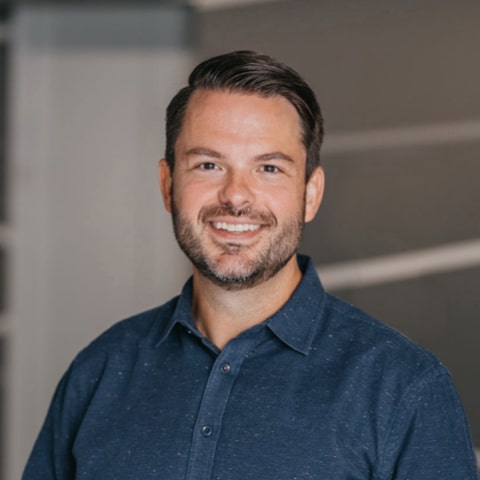
Cory Wheeler

Meredith Albertson
Today's Guests


